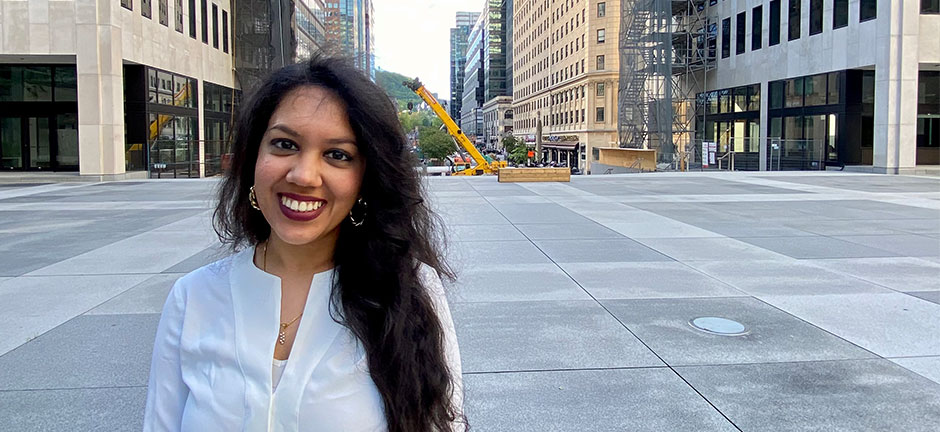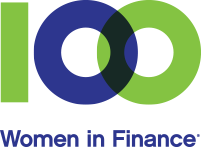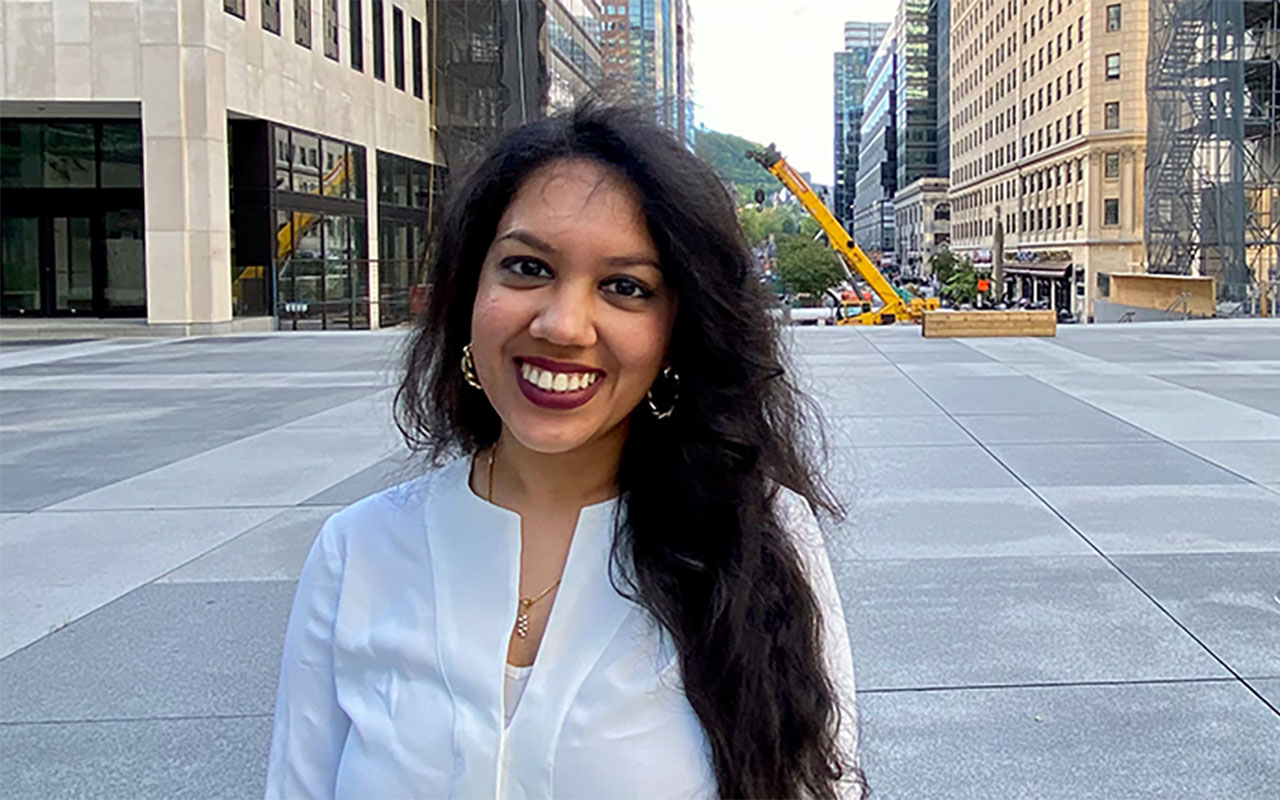
Urmi Hossain Associate, RBC Dominion Securities
There are pivotal moments in life that can trigger individuals to introspectively reflect on their careers. For some, it may be a cumulative stirring over time that creates the desire to change or shift the momentum of their current path. For others, it may be an unpredictable forced event that causes one to pause and evaluate where one is and where one wants to go. It was during the COVID-19 pandemic that Urmi Hossain realized it was time for a change and learned some invaluable lessons along the way.
Tell us about your initial career experiences navigating the financial industry and how it shifted over the years.
Often when we graduate from college, we take a job because we need it to get experience and to earn money. I felt I needed to get a practical feel in finance, given that my educational background was mainly finance-based and I was pursuing my CFA designation. Our job choice is often based on whether it’s a good fit for that particular moment in time and choose a company if we see ourselves there in the short to medium term. One of my goals was to learn as much as possible until I figured out who I was and what I really wanted in life.
You mentioned that your career shift was triggered by the COVID-19 pandemic. What about that time period impacted how you thought about your current job?
The pandemic brought many disruptions in the world as much as in the job market. Given the abundant time available on my hands, it gave me time to reflect on what to do with my life, especially when it came to my career choices. Being in the financial services industry for about six years with an educational background in finance, I decided that it was probably the best time for me to change as well.
Once you decided to explore other job opportunities, what specifically were you hoping to find in your new career path that would create a more fulfilling position closer in line with your ‘true self’?
In my new job, I was looking for many things. I wanted to join a company whose values were similar to mine in that they promoted diversity and inclusion. I wanted a good working environment that encouraged healthy relationships, growth, and advancement, but also gave the flexibility to share ideas and opinions that lead to change. I envisioned a place where I could learn finance and apply my financial knowledge as well as learn from others who have been in the financial industry for a long time. And, finally, I was looking for a company that was also committed to corporate social responsibility.
As you were shifting career directions, what was your experience during the job interview process?
I started my job search more or less a year ago. I remember applying to many places, getting plenty of call backs, and going through many interviews, yet never getting an official offer. Ninety-nine percent of the time, I was getting rejected and wondering what was wrong with me. I felt I had a stellar resume with the required experience and knowledge, yet I wasn’t able to sell myself to any potential employer. This process went on and on for many months to the point that I felt like giving up and just staying in my current job. Moreover, I would feel discouraged during the interviews when I recognized that many of the management composition lacked female representation and little diversity among employees.
You mentioned that you had a rough patch going through the interview process and struggled to land a job…and then you got three great offers simultaneously. What do you think was the difference between the succession of not landing a job and then receiving three great job offers?
I think the difference is that I changed how I approached the interview process. When you are so desperate to change jobs you may come across as that during the interview. So, I just tried to be myself: spontaneous and natural. I took time to do research on the company and really understand more about their workplace environment by asking a lot of questions. I don’t believe an interview should be an interrogation but a conversation. When the interview shifted to be more conversational and their values aligned with many of mine, I started to notice a more mutual fit for both the company and me. I think that was key in the interviews I felt most positive about: people wanted to know me as a person as well as my work experience.
You said that many of the companies where you interviewed were lacking in female gender representation and diversity. Did you reflect on what role you could play in expanding or promoting more equality in the finance workplace as a female representative in the industry?
Yes, I did. The finance industry is male-dominated and I would often get demotivated when there were very few females or women of color in management positions. It discouraged me so much that I didn’t want to apply to those companies. But, I realized I shouldn’t give up on this. I should still apply and show that females bring competence and value to the corporate workplace. My hope was to lead by example and show other women to never underestimate their skills. I wanted to establish more leadership roles so I could be part of the movement to implement changes for a more gender equal work environment.
Considering you’ve been in the financial workplace for several years, were you able to network with others in the industry to help you in your search?
I have a lot of connections or someone who knew someone tied to the finance world. I sought out everyone I could think of working in the industry including friends, ex-colleagues, and LinkedIn profiles to get insight into each company I received a job offer from. I wanted to have a real feel of what it might be like to work for these respective companies. The more info I could get, the more I could brainstorm with others, the closer I was to making the best decision for my goals. In the end, I wanted to make sure I was making the right decision. You feel it from inside that IT IS THE ONE. That’s how I knew when I made my final decision which job to accept.
Now that you’ve had a chance to consider navigating a career change, how might you summarize what lessons you learned during the process?
While it’s not a seamless journey and I encountered many challenges along the way, these are a few reflections of the lessons learned:
- It’s often about timing. While you might feel desperate to make the job change, take the time to find the right fit. Be honest with what you want and with persistence and patience, you will find that job. You will feel it when it happens.
- Choose what’s best for you and that will serve your purpose in life. Every person has life experiences unique to them: goals they have set for themself, personality traits, life responsibilities and demands, etc. Avoid settling for a job if you know in your heart that it’s not the right fit.
- Rejections/redirections. Like anything in life, we can be discouraged, frustrated, maybe hurt when we get turned down or overlooked. Rather than see that as rejection, consider that it serves a purpose to redirect you to what’s right for you and set you on a new and exciting path.
- Use your resources and support group. Regardless of where you are on your career path, take advantage of available networks to move you along the job search journey. There are always people that can connect you either directly or through other lines of connection.
- Be the change you want to see in the workplace. Choose what’s best for you and what will serve your purpose in life. While you may not have control over everything going on, you can be an influence to generate change in a positive way. Focus on what you are passionate about and find creative ways to make a positive impact in your workplace environment.

